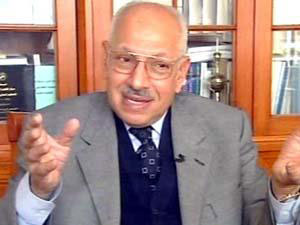 It is no overstatement to say that this month has been quite eventful. Given that a few of these events go contrary to all reason and to normal states of affairs, however, they definitely qualify as bombshells. Three incidents in specific warrant comment.
It is no overstatement to say that this month has been quite eventful. Given that a few of these events go contrary to all reason and to normal states of affairs, however, they definitely qualify as bombshells. Three incidents in specific warrant comment.
Problems on hold:Bombshells
Youseef Sidhom
Opinion
00:02
Sunday ,28 February 2010

Abul-Magd out The first is the dismissal of Kamal Abul-Magd from the National Council for Human Rights (NCHR), which came within a major shake-up of the board of the government-affiliated body. Dr Abul-Magd, who was deputy to the head of the NCHR since its establishment in 2004, shouldered the responsibility of his post with capability and integrity. The State-owned Cairo daily Al-Ahram wrote that Dr Abul-Magd’s ousting came as a total surprise, and that he had a resounding reputation of integrity, independence, and strength in reporting on human rights in Egypt.Dr Abul-Magd’s dismissal was a real loss to the NCHR but, worse, it came with no explanation. This, sadly, is not so unusual in our country where the people are frequently ‘mere spectators’ in events which directly impact them. Countless hypotheses have been offered to explain Dr Abu-Magd’s ousting. Foremost among them was that the authorities were fed up with his vociferous condemnation—evident in the council’s annual or fact-finding reports, the most recent of which was the one on the Nag Hammadi Christmas Eve crime last January—of official violation of human rights. But it is the Shura Council—the upper house of Egypt’s Parliament and the body to which the NCHR is affiliated—that bears the worst brunt for the decision to dismiss Dr Abul-Magd. The message is that the Shura has reached the end of its patience with criticism of human rights violations. Observers of last week’s sessions of the International Council on Human Rights in Geneva, however, understand very well that there is no point in falsifying or concealing facts about human rights anywhere in the world. It is in Egypt’s direct interest to monitor abuses and treat them before the international community takes it upon itself to draw attention to that.Dr Abul-Magd’s dismissal is a huge loss to the NCHR and to Egypt, but is—sadly—only one among a series of inexplicable losses of brilliant persons who served their country with utmost dedication.
Women down The second shock was the overwhelming majority decision taken by the general assembly of the State Council, Egypt’s top administrative court, against appointing women as judges in the council. The decision aroused huge controversy in judicial circles and electrified liberals, patriots, and human rights activists. Why is it that every time we take a step forward we are pulled back several steps? It took Egypt years to establish the right of women to rule as judges then, just as we were looking at other areas of discrimination against women in order to rectify them, we suffer a relapse. And where? In the very stronghold of justice and enlightenment. It was comforting to see women stand up for their rights and, even more comforting, to see men share their stand. As for the media controversy which erupted over what rights should be granted to women and what withheld, I can only quote what Saad Eddin Ibrahim once wrote on the issue. “Were all the men in the world meet and decide to grant women their full rights, it would be a huge insult to women, who are unequivocally entitled to these rights as humans and citizens.”
What culprits?The Dairout court ruling which acquitted all four culprits charged with killing the Copt Henry Attallah, 61, last October, shocked Copts. Attallah’s 29-year-old son Malak had had an affair with a young Muslim woman, and allegedly posted indecent pictures of her on the Internet. The affair became public and the young man fled town. In retaliation, her family brutally killed the father. Again, Copts find themselves before a crime with no killers and an impotent justice. This is not the first nor will it be the last such incident as long as the police and prosecution investigations remain deficient; a suspect is caught with no incriminating evidence and a killer runs free.



